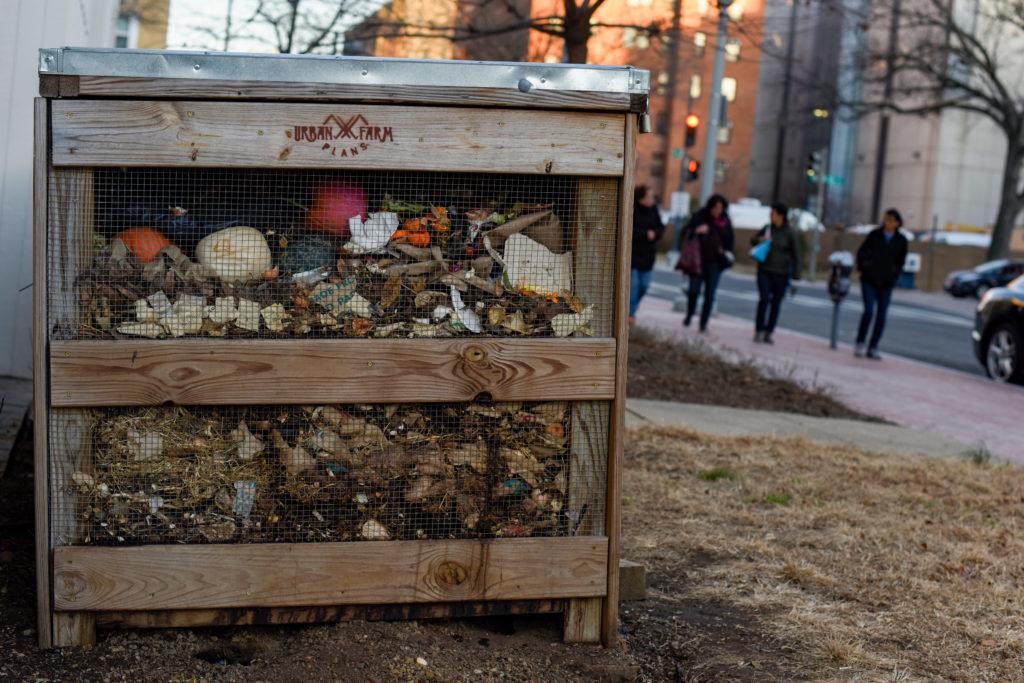Students will be able to bring their food scraps to Kogan Plaza every Friday beginning next month in an effort to reduce food waste on campus.
The Office of Sustainability and Campaign GW, a student organization that supports sustainability and campus planning efforts, will pilot a composting program starting Feb. 2 that will create a weekly food waste collection service in Kogan. Leaders of the project said it will boost GW’s sustainability effort by cutting down on the amount of food scraps that are trashed.
Participants will be able to bring scraps between 10 a.m. and noon on Fridays. A team of student volunteers will sort the compost.
University spokesman Tim Pierce said if the program is successful, then the Office of Sustainability, GW Zero Waste and Campaign GW will look to expand the pilot program University-wide.
“This is an important program for the Office of Sustainability because it provides an opportunity to educate students about proper composting and raise the visibility of sustainability efforts on campus,” he said in an email.
Pierce said compost produced by the project will be sent to Maryland Environmental Service in Prince George’s County and turned into Leafgro Gold, a composting mixture composed of food waste and yard scraps that can be used for planting in gardens and farms.
Campus dining vendors, including the five restaurants in the District House basement, already compost in the University “back-of-house” initiative. Pelham Commons on the Mount Vernon Campus has run a similar program since 2010, according to GW’s sustainability website.
Two students involved in GW’s sustainability effort said they decided to start the program last summer after seeing the need for a more widespread composting program on campus during Colonial Inauguration lunches.
The students will act as monitors when students haul their food scraps to Kogan each week. A group of 14 student volunteers will help run the project.
Charlie Cevallos, a fifth-year graduate student in the Environmental Resource Policy Program and stakeholder engagement intern for the Office of Sustainability, said that while there won’t be any permanent bins around campus used for food waste collection, students are encouraged to freeze their scraps in zip-lock bags to prevent any odor in their residence halls.
Cevallos said student volunteers will monitor how many students bring food waste to be composted each week, and sort through the scraps to make sure there isn’t any plastic or non-compostable items. He said the scraps will then be taken to the loading dock behind District House and the Marvin Center, and eventually to an industrial composter.
“The great thing is that the infrastructure is already existing,” he said. “There’s already bins for composting on campus, there’s already regular composting pick up I think four times a week now, so we’re just squeezing the little bit of compost onto a lot of what is already happening.”
Colin O’Brien, a sophomore and member of Campaign GW, said students will be able to sign up for the program online by residence hall. The pilot program will also feature an educational campaign teaching students how they can compost waste products like apple cores and egg shells.
“The biggest thing with this is the education side,” he said. “Letting people know what is compostable, what isn’t, and getting the sorting of food waste from non-organic trashes like plastics and metals, getting them separated from food is the biggest goal.”
O’Brien said composting can also avoid “gross” and “sticky” trash in residence halls.
“Everything that would rot is going into your compost and making your trash bin cleaner,” he said. “When you go and dump the trash in a trash room in your residence hall it’s not going to be as gross for you.”
Izzy Moody, the garden manager of the GroW Garden, said that while the pilot program is not affiliated with the GroW Garden, she hopes that having a more widespread program on campus will help students become more connected with the process of composting and the impact of reducing food waste in an urban environment.
“Food waste is absolutely a valuable commodity because it can become something that enriches soil and causes food to grow,” she said. “I think that what the garden has done this far, it has played a really big part in enabling student to compost on campus, and we’re really supportive of the pilot program.”
Sarah Roach and Meredith Roaten contributed reporting.





